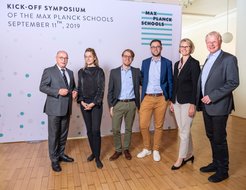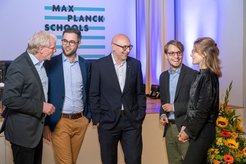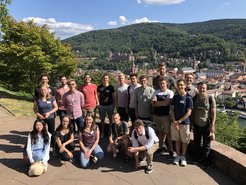Opening Ceremony of the Max Planck Schools
The three pilot Schools officially welcome their first students at the Harnack House

Berlin, September 11th: The Max Planck Schools have kicked off their first year with an opening ceremony. On this occasion, Anja Karliczek, the Federal Minister for Education and Research, welcomed the first student cohort: “It is wonderful to see so many ambitious and extremely promising graduates and doctoral students from all over the world, who are enriching German science by enrolling at one of the new Max Planck Schools. They are part of a highly innovative pilot project based on the concept of decentralised, research-based teaching, which is jointly funded by universities and research institutions. This experiment is one of the most innovative projects in Germany in terms of top-class teaching structures.” Also present at the welcoming symposium were representatives of the numerous Max Planck School partner organizations, many of the scientists engaged in the initiative, and several early supporters of the Schools.
Official start of Schools in Berlin
The symposium was characterized by multidisciplinary collegial exchange amongst members of participating institutions across a wide range of career stages. In his welcoming address, Martin Stratmann, President of the Max Planck Society and co-initiator of the project, emphasized the core idea of the Max Planck Schools: distributed research excellence under one roof. "Each School involves very different disciplines. Doctoral students can make use of this diversity and create their own new science in their minds! In this way, they create an individual basis for their careers. The thematic breadth and the opportunity to get to know the entire diversity of the German research and higher education landscape is unique and, in my opinion, also the essential difference to other graduate programs," he explained.

Peter-André Alt, President of the German Rectors' Conference (HRK), who is providing strategic support to the initiative together with the Max Planck Society President, focused on the future: "The doctorate is not only the first step in a scientific career, but also opens up opportunities for challenging activities outside universities or research institutions. The Max Planck Schools therefore also offer doctoral candidates broad qualifications and cooperate with partners, for example from industry." And Stefan Hell, Nobel Laureate and Fellow at both the Max Planck Schools of Matter to Life and Photonics, added in his lecture, "Stay grounded and reach for the stars!”
Introductory week at the MPI in Heidelberg
The Max Planck School Matter to Life started last week with a Summer School at the Max Planck Institute for Medical Research in Heidelberg. The selection of the very first group of Master students for the school revealed a great and international interest in this integrated Master/PhD program, said Joachim Spatz, who is spokesperson of the new Max Planck School and director at the Heidelberg institute. The first group of 20 Master students includes six who have done their Master in the USA. Overall, 10 nations are represented. "In this way we are recruiting clever, innovative people for Germany. The high level of motivation among the students was apparent even in the introductory week. They want to get the maximum from their participation in the program." The applicants had to go through a demanding and competitive procedure to be selected. Now their training is what counts. The structure of the School, with its participating scientists from first-rate research locations in Germany, is simultaneously a platform for scientific exchange between the teachers. Joachim Spatz is excited. "This structure generates new research questions and projects which would not otherwise emerge", he says.

The selected doctoral candidates themselves made it clear why they applied to the Max Planck Schools. "For a young chemist seeking to follow an interdisciplinary road in science and research, the Max Planck School Matter to Life offers a unique opportunity to work with pioneer scientist in many different fields," said Aysecan Unal, who is starting as a master student at the Max Planck School Matter to Life. “As an international student, I am very excited to start searching an answer to the ultimate question "What is Life?" with masters and PhD students all around the world with physics, biology and chemistry backgrounds under the supervision of extraordinary scientists”. Niklas Rindtorff, a future PhD candidate at the Max Planck School Matter to Life, emphasized the clear commitment to cooperation and interdisciplinarity, the claim to excellence, and the thematic diversity that forces everyone to think outside the box.
Max Planck Schools – a joint initiative between German Universities and German Research Organizations
Distributed research excellence under one roof is the main idea behind the Max Planck Schools, which were founded in 2017 by Federal Research Minister Johanna Wanka, Max Planck Society President Martin Stratmann, and President of the German Rectors' Conference Horst Hippler. Since then, 27 Universities and more than 30 research institutions have joined the initiative. The Federal Ministry of Education and Research is funding the initiative with 45 million euros. The main partners involved in the Max Planck School Matter to Life are the universities in Heidelberg and Göttingen, the Technical University Munich, the Leibniz Institute for Interactive Materials at RWTH Aachen and several Max Planck Institutes in Germany. In Heidelberg, the German Cancer Research Center (DKFZ) and the Heidelberg Institute for Theoretical Studies (HITS) are also involved in the Max Planck School Matter to Life. More than 50 scientists and professors of these institutions are involved in teaching and supervising the students of the school.


